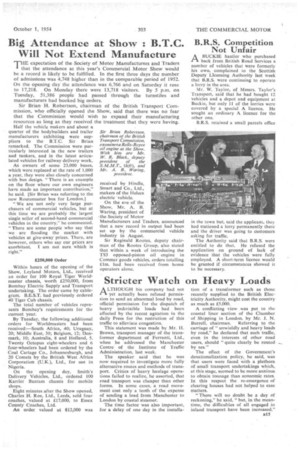Stricter Watch on Heavy Loads
Page 53

If you've noticed an error in this article please click here to report it so we can fix it.
ALTHOUGH his company had not yet actually been refused permission to send an abnormal load by road, official permission for the dispatch of• heavy indivisible loads had been affected by the recent agitation in the daily Press for the restriction of this traffic to alleviate congestion.
This statement was made by Mr. H. Brown, transport manager of the transformer department of Ferranti, Ltd., when he addressed the Manchester Centre of the Institute of Traffic Administration, last week.
The speaker said that he was now required to investigate more fully alternative routes and methods of transport. Critics of heavy haulage operations failed to realize, he asserted, that road transport was cheaper than other forms. In some cases, a road movement cost only a -tenth of the expense of sending a load from Manchester to London by coastal steamer.
The time factor was also important, for a delay of one day in the installa tion of a transformer such as those recently supplied to the British Electricity Authority, might cost the country as much as £5.000.
A conflicting view was put to the coastal liner section of the Chamber of Shipping in London, by Mr. J. N.
Burrell, chairman, Referring to the carriage of " unwieldly and heavy loads by road," he declared that such traffic, even in the interests of other road users, should "quite clearly be routed — by sea."
The effect of the Government's denationalization policy, he said, was that users were faced with a plethora of small transport undertakings which, at this stage, seemed to be more anxious to obtain tonnage than economic rates. In this respect the re-emergence of clearing houses had not helped to ease matters.
"There will no doubt be a day of reckoning," he said, "but, in the meantime, the difficulties of all engaged in inland transport have been increased."




























































































































































